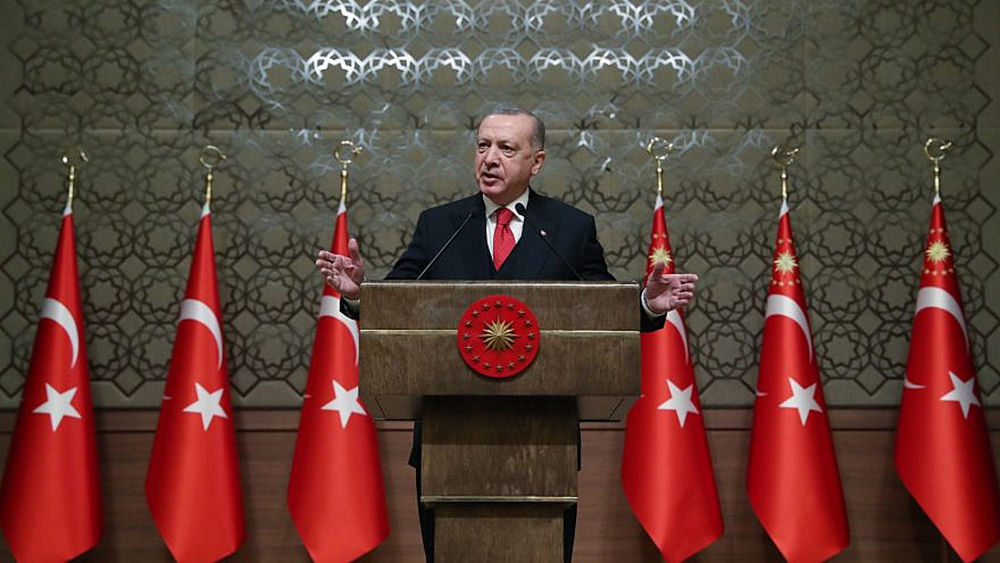|
Getting your Trinity Audio player ready...
|
Recep Tayyip Erdoğan is almost certain to win the runoff election in May, and experts tell JNS that’s probably a good thing for the Jewish state.
By: Shimon Sherman
Turkey’s High Election Board (YSK) declared on Monday that the country would be heading to a runoff election in late May after incumbent President Recep Tayyip Erdoğan failed to secure more than 50% of the vote in Sunday’s election. In Turkey, a candidate must win a majority of the vote to win the election outright. Otherwise, another election is held between the two leading candidates.
Erdoğan faced possibly his most formidable challenge in this election round, after almost 20 years of serving in Turkey’s highest office, from opposition leader Kemal Kilicdaroglu. Opinion polling before the election showed a razor-thin race, with many polls placing Kilicdaroglu above the 50% mark. However, Monday’s results told a different story.
YSK said in a statement on Monday evening local time that with 100% of the ballots counted, Eroğan had received 49.51% of the vote, Kilicdaroglu 44.88% and third-place candidate Sinan Ogan, whom many have called a “kingmaker” in the runoff election, 5.17%.
In a post-election speech given from the balcony of the ruling AKP party headquarters, Erdoğan thanked his supporters and said he appreciated the “outcome of the national will and the clear lead that was delivered,” signaling his confidence regarding the upcoming May 28 runoff vote.
Meanwhile, Kilicdaroglu delivered a much more somber message, questioning the integrity of the election process and accusing Erdoğan of “blocking the will of Turkey” and turning the election into “a fait accompli.” However, Kilicdaroglu also signaled confidence regarding the run-off election, saying, “If our nation says a second round, we accept it. We will win this election in the second round.”
Despite Kilicdaroglu’s confidence, however, many analysts have signaled that the second round will almost certainly go to Erdoğan. Dr. Hay Eytan Cohen Yanarocak, an expert on modern Turkey at the Jerusalem Institute for Strategy and Security (JISS) and the Moshe Dayan Center at Tel Aviv University, told JNS that in his view Erdoğan will “almost certainly” win.
‘Relationship has certainly taken a hit’
Gallia Lindenstrauss, a senior research fellow at the Institute for National Security Studies (INSS), agreed, saying: “At this point, Kilicdaroglu’s chances are slim to none.”
For the past few months, this election has mostly pivoted around economic issues, with historic inflation recently plaguing Turkey. In addition, the February earthquake which claimed the lives of more than 50,000 people in Southern Anatolia, and the government’s slow response to the natural disaster, was another major campaign issue in the election.
Besides economics, Turkey’s elections also have major implications for the country’s foreign policy, including Turkey’s relationship with Israel.
Erdoğan currently leads a bloc of mostly Islamist parties in Turkey’s parliament and has in the past expressed anti-Western sentiment. Furthermore, he has traditionally led a very cold foreign policy towards Israel, which has even elevated into open hostility a few times during his 20-year rule.
“The Israeli-Turkish relationship has certainly taken a hit under Erdoğan’s rule,” said Lindenstrauss. By contrast, Kilicdaroglu has traditionally been seen as a pro-Western candidate. He has on several occasions signaled his interest in pivoting Ankara’s foreign policy more in the direction of the United States and Europe, and further from the Islamist influence which has significantly expanded in Turkey in recent years.
(JNS.org)





